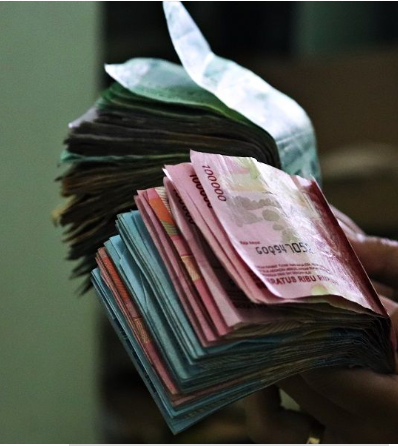
STRATEGIC ASSESSMENT. The USD to IDR exchange rate rose after the latest trade data from Indonesia. Data by the government showed that export growth slumped by 29.4% in April after falling by 11.6% in March. Analysts were expecting exports to plunge by 18.55%. It was the second straight month of decline and the worst plunge since May 2020.
At the same time, imports continued slumping in April of this year. Import growth dropped by 22.325 in April after falling by 6.26% and 4.32% in March and February, respectively. Import growth has plunged in the past three months.
As a result, Indonesia’s trade surplus increased to $3.94 billion in April from the previous $2.91 billion in March. In all, the country’s surplus has crashed from $7.56 billion in April 2022.
It’s too early for Indonesia’s central bank to consider cutting interest rates, a member of the bank’s board of governors said even as the country’s inflation eases but concerns over slowing growth mount as exports slow.
Bank Indonesia (BI) has kept policy rates unchanged since its last rate hike in January and repeatedly said its rate hikes, totalling 225 basis points since last year, were sufficient to guide inflation back to within target in the second half of 2023.
Former Vice President Jusuf Kalla said Indonesia’s ethnic Chinese-dominated economy was surprising, given that the number of ethnic Chinese in Indonesia is only about 4.5 million. He expressed hope that native Indonesians would be encouraged to increase their competitiveness.
Indonesian exports plummeted last month, yet the country maintained its trade surplus because imports dropped even further, as a feeble global economy takes its toll on the exchange of goods and services. Statistics Indonesia (BPS) reported on Monday that the country’s exports exceeded imports by $3.94 billion in April, making for a 36-month trade surplus.
BPS official Imam Machdi said the prices of key export commodities such as palm oil, coal and nickel had risen in monthly terms but were down on the year, which may mark the end of the commodity windfall Indonesia enjoyed throughout 2022.
The decrease in coal and palm oil exports, he added, was a result of dwindling volumes, while the drop in iron and steel exports was due to lower global prices for those commodities. “China’s zero-emission policy affected coal demand in China, thereby affecting [Indonesia’s] coal exports,” said Imam, after attributing the trade cascade to “China’s economic slowdown.”
Human rights violations and environmental abuses were found in two nickel supply chains in the Philippines and Indonesia, home to more than half of the world’s supplies. They provide batteries to companies including Panasonic, Tesla, and Toyota, said a report released Tuesday by a rights research group.
The lack of transparency in electric vehicle battery supply chains means end-user companies must be held responsible, as they can easily distance themselves from the lower-level abuses and avoid addressing associated risks, the London-based Business & Human Rights Resource Centre (BHRRC) said in its report “Powering Electric Vehicles.”
The Rio Tuba Nickel Mining Corporation (Rio Tuba) in the Philippines, and Zhejiang Huayou Cobalt (ZHC) and CNGR Advanced Materials (CNGR), two Chinese companies operating in Indonesia, are responsible for “rising incidents of human and environmental rights violations,” the group said.
Indonesia is set to lose its title as the world’s fourth-most populous nation by 2045 amid slowing birth rates, according to the Ministry of National Planning. A recent survey the ministry conducted with the statistics agency indicates Indonesia’s population growth will slow to 0.4% in 2045, from 1.17% last year. That means, in the next 22 years, Southeast Asia’s biggest economy will be home to 324 million people, placing the country behind Nigeria and Pakistan in the demographic ranking.
A second Indonesian state-owned builder is seeking restructuring as the country’s construction push heightens worries about the sector’s ballooning debt burden. PT Wijaya Karya has asked banks to allow it to delay making payments on its liabilities as it seeks to reorganize debt and strengthen its capital, an executive said. The nation’s largest listed construction company, PT Waskita Karya, got approval in February from investors to defer payments on three rupiah-denominated bonds.
Indonesia’s biggest Islamic lender Bank Syariah Indonesia (BSI) said it was working with regulators to bulletproof its cybersecurity after media reports that account details of 15 million customers were published online. The data breach, which one cybersecurity expert said was the country’s worst at a financial institution, is the latest in a series of leaks at Indonesian companies and government agencies in the past few years.
One of the top 10 lenders in Indonesia, BSI in a statement did not confirm that its data had been leaked, but said it was “conducting recovery, audit and mitigation efforts so that similar disruptions do not occur”.
Indonesia is turning to the yen market for a rare sale of blue bonds to raise funds for ocean-related projects. The Southeast Asian country is marketing a Samurai deal which includes several blue bond tranches. It would be the first such issuance of yen-denominated debt from a foreign borrower, according to the underwriters.
Japanese seafood company Maruha Nichiro Corp. also sold the country’s inaugural blue note last year. Only a handful of issuers globally have sold blue bonds, which were pioneered by the island nation of Seychelles in 2018. The variant of green debt typically channels funds into areas such as marine conservation and improving water resources, underscoring some of the issues posed by climate change.
Even so, issuance has been scarce, especially with increasing scrutiny on the use of funds raised from environmental, social and governance debt.





